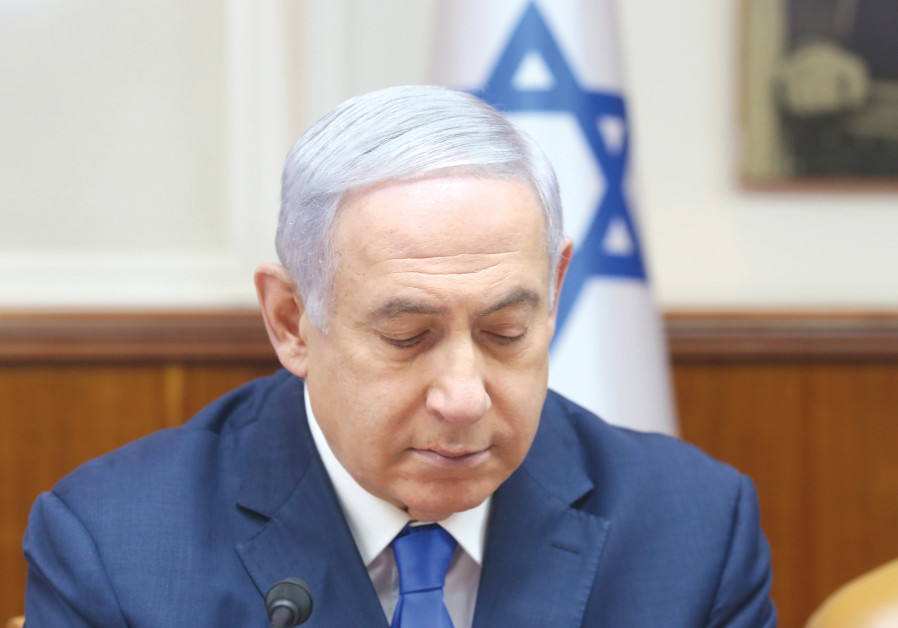Why did Netanyahu suddenly seek to cancel the election he initiated?

THE FALSE narratives about Prime Minister Benjamin Netanyahu also make the establishment of a unity government with the Center-Left impossible. (photo credit: MARC ISRAEL SELLEM/THE JERUSALEM POST)
Circle November 5, 2019, on your calendars. And mark it by doing absolutely nothing.
Why November 5?
Because that was the date that by law was supposed to be the only Election Day Israel would have in 2019.
Prime Minister Benjamin Netanyahu moved up that election to April 9 in the race he initiated on December 24.
When he couldn’t form a government, he initiated the September 17 election on May 29.
And this week, Netanyahu tried to get that election canceled and form a government that technically could have lasted until November 7, 2023.
This list of dates is indeed dizzying – especially for political correspondents. And each and every step took the press and the public by surprise.
His reasons for initiating the two elections have been explained at length. (Avoiding prosecution is the answer if you don’t like Netanyahu, staying in power to help guide Israel to a brighter future is the answer if you do.)
But why did Netanyahu go on this week’s election elimination escapade, in which he sent Knesset Speaker Yuli Edelstein to find legal procedures and political partners to cancel the dispersal of the parliament and build a new coalition?
THE ANSWERS to that question are more complicated, and there are many.
The first answer is the purest one: elections are costly and bad for the country. But didn’t they know that before the majority of the Knesset voted to initiate the race?
Yes – but that unfortunate reality was reinforced by the budget cuts approved Monday in all the ministries, including education, healthcare and welfare.
Now that the pure reason is out of the way, the rest of the answers are political. The same day it was leaked to Channel 12 that Knesset Speaker Yuli Edelstein was seeking to cancel the election, Netanyahu received polls he summoned from Smith Research.
The polls found that 69% of Israelis favored canceling the election if a wide unity government could be formed. They also found that Netanyahu will have an extremely difficult time obtaining 61 seats without Yisrael Beytenu to enable building a coalition.
Not only is the Likud not succeeding in wooing Russian-speaking voters from Yisrael Beytenu, but party leader Avigdor Liberman is succeeding in wooing veteran Israelis from the Likud with his anti-haredi campaign. The expected higher Arab turnout when the Arab parties unite, coupled with lower Jewish turnout due to frustration over the second race in five months, could be disastrous for the Likud and the Right.
The public is angry at Netanyahu (and Liberman) for initiating the unnecessary election. Inviting Blue and White to negotiate and receiving a negative answer both allow Netanyahu to spread the blame to Blue and White leader Benny Gantz.
There was also the unlikely but still possible scenario that Gantz could have said yes and joined Netanyahu’s government. It is unlikely because it involves complicated legal procedures and Gantz betraying his voters.
It is still possible, because former prime minister Ehud Barak has entered politics and taken seats away from Blue and White. If Gantz sees that Barak prevents Blue and White from becoming the largest party and him from getting a chance to form a government, he may decide to accept Netanyahu’s offer and become defense minister.
Netanyahu’s ideal scenario would be to draft Gantz’s Israel Resilience Party out of Blue and White, without Yesh Atid. Breaking up Blue and White would be another accomplishment for the prime minister.
If Gantz would allow Netanyahu to cancel the election, the prime minister could then seek to pass the bills that would help his legal cases – like the immunity bill; the Supreme Court override bill; the Supreme Court term limit bill; legislation that would increase the number of Supreme Court judges; and the bill that would give the cabinet the right to select judges.
Canceling the election would also enable Netanyahu’s friends to continue with their diplomatic plans. Jared Kushner and Jason Greenblatt unveiled the economic aspects of their plan in Bahrain this week.
The diplomatic and security parts of the plan are on hold until after Israel’s election is over, and could also be postponed by American election, which there is no guarantee that Trump will win. Netanyahu wants such a purportedly pro-Israel plan to see the light of the day and initiate facts on the ground for the future that the Palestinian Authority’s rejection would not erase.
FOR ALL those reasons, seeking the cancellation of the election made sense for Netanyahu. For the same reason, Netanyahu broke his promise not to negotiate with parties left of Likud.
He negotiated with the Labor Party. He reportedly offered Gantz a rotation in the Prime Minister’s Office. This week it was revealed that Netanyahu even sent his former chief of staff Natan Eshel to offer benefits to the United Arab List.
There were MKs this week who said cynically that they would not be surprised if security tensions come soon that could also result in the election’s cancellation.
Such a scenario would be awful, but it would not be unexpected.
After so many election dates have come and gone, one can only look back and wish that the only significant date would have been the day on which nothing is now expected to happen: Good old November 5, 2019.
Join Jerusalem Post Premium Plus now for just $5 and upgrade your experience with an ads-free website and exclusive content. Click here>>






Comments are closed.